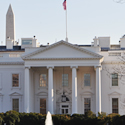National
White House responds to Va. anti-gay adoption bill
Placement shouldn’t be based on ‘discriminatory and irrelevant factors’

The White House, in response to a Washington Blade inquiry about anti-gay adoption legislation moving through the Virginia Legislature, said Monday night President Obama believes adoption placement shouldn’t be “based on discriminatory and irrelevant factors.”
“While the president does not weigh in on every single action taken by legislative bodies in our country, he has long believed that we must ensure adoption rights for all couples and individuals based on their interest in offering a loving home, not based on discriminatory and irrelevant factors,” said Shin Inouye, a White House spokesperson. “He recognizes that adoptive families come in many forms, and that we must do all we can to break down barriers to ensure that all qualified caregivers have the ability to serve as adoptive families.”
Legislation is moving through the Republican-controlled Virginia Legislature that would allow private adoption agencies to discriminate in placements conflicting with their religious or moral beliefs, including on the basis of sexual orientation. The Virginia House voted last week 71-28 to pass the bill and the Senate is likely to vote on it in the coming days. Gov. Bob McDonnell (R) is expected to sign the bill should it reach his desk.
Current policy in Virginia prevents unmarried couples — straight or gay — from adopting. But critics say the new legislation would codify the policy into law.
Jeff Caldwell, a McDonnell spokesperson, reaffirmed via email in response to the White House statement that the governor supports the adoption legislation because it allows faith-based agencies to place children in homes in accordance with their beliefs.
“If/when it passes the General Assembly and reaches his desk, he will sign it,” Caldwell said. “The governor has expressed his belief that faith-based adoption agencies should not be required to conduct adoption services that run counter to their religious beliefs, understanding that these organizations conduct a large portion of the state’s adoptions and could cease working to find homes for these children if they feel they cannot do it in accordance with their beliefs.”
But, according to committee testimony from the Family Equality Council, the legislation would go beyond faith-based agencies and allow all licensed organizations to make placement decisions in accordance with religious or moral policies. Additionally, the group says the bill isn’t limited to religious beliefs and would allow private entities to withhold placement based on any kind of moral objection.
Federal legislation pending before Congress known as the Every Child Deserves a Family Act would trump the pending anti-gay bill in Virginia by allowing the U.S government to restrict federal funds from going to states that have laws or practices allowing for discrimination in adoption on the basis of LGBT status.
The legislation is sponsored by Rep. Pete Stark (D-Calif.) in the House and Sen. Kirsten Gillibrand (D-N.Y.) in the Senate. President Obama has said he’s generally supportive of adoption rights for all couples, but he hasn’t yet declared support for the measure.
Asked whether Obama would endorse the federal bill as a means of countering the Virginia measure, Inouye said in the same statement, “While we have not reviewed Congressman Stark’s legislation, we share its goals to expand adoption rights and move the dialogue forward on this issue.”
Jennifer Chrisler, executive director of the Family Equality Council, said in a statement her organization shares concerns about the Virginia adoption bill and the belief that discriminatory factors shouldn’t prevent children from finding homes.
“We are gravely concerned about the proposed legislation in Virginia because it attempts to place the private religious beliefs of organizations above the best interests of children in the public foster care system,” Chrisler said. “President Obama has long believed that every child deserves a loving family and that all qualified parents who can provide a stable family should be considered and not face discrimination. We join with the president in expressing support for the goals of the Every Child Deserves A Family Act so that our country can open up every available home to the 424,000 children in foster care.”
U.S. Supreme Court
Supreme Court to consider bans on trans athletes in school sports
27 states have passed laws limiting participation in athletics programs

The U.S. Supreme Court on Thursday agreed to hear two cases involving transgender youth challenging bans prohibiting them from participating in school sports.
In Little v. Hecox, plaintiffs represented by the ACLU, Legal Voice, and the law firm Cooley are challenging Idaho’s 2020 ban, which requires sex testing to adjudicate questions of an athlete’s eligibility.
The 9th U.S. Circuit Court of Appeals described the process in a 2023 decision halting the policy’s enforcement pending an outcome in the litigation. The “sex dispute verification process, whereby any individual can ‘dispute’ the sex of any female student athlete in the state of Idaho,” the court wrote, would “require her to undergo intrusive medical procedures to verify her sex, including gynecological exams.”
In West Virginia v. B.P.J., Lambda Legal, the ACLU, the ACLU of West Virginia, and Cooley are representing a trans middle school student challenging the Mountain State’s 2021 ban on trans athletes.
The plaintiff was participating in cross country when the law was passed, taking puberty blockers that would have significantly reduced the chances that she could have a physiological advantage over cisgender peers.
“Like any other educational program, school athletic programs should be accessible for everyone regardless of their sex or transgender status,” said Joshua Block, senior counsel for the ACLU’s LGBTQ and HIV Project. “Trans kids play sports for the same reasons their peers do — to learn perseverance, dedication, teamwork, and to simply have fun with their friends,” Block said.
He added, “Categorically excluding kids from school sports just because they are transgender will only make our schools less safe and more hurtful places for all youth. We believe the lower courts were right to block these discriminatory laws, and we will continue to defend the freedom of all kids to play.”
“Our client just wants to play sports with her friends and peers,” said Lambda Legal Senior Counsel Tara Borelli. “Everyone understands the value of participating in team athletics, for fitness, leadership, socialization, and myriad other benefits.”
Borelli continued, “The U.S. Court of Appeals for the Fourth Circuit last April issued a thoughtful and thorough ruling allowing B.P.J. to continue participating in track events. That well-reasoned decision should stand the test of time, and we stand ready to defend it.”
Shortly after taking control of both legislative chambers, Republican members of Congress tried — unsuccessfully — to pass a national ban like those now enforced in 27 states since 2020.
Federal Government
UPenn erases Lia Thomas’s records as part of settlement with White House
University agreed to ban trans women from women’s sports teams

In a settlement with the Trump-Vance administration announced on Tuesday, the University of Pennsylvania will ban transgender athletes from competing and erase swimming records set by transgender former student Lia Thomas.
The U.S. Department of Education’s Office for Civil Rights found the university in violation of Title IX, the federal rights law barring sex based discrimination in educational institutions, by “permitting males to compete in women’s intercollegiate athletics and to occupy women-only intimate facilities.”
The statement issued by University of Pennsylvania President J. Larry Jameson highlighted how the law’s interpretation was changed substantially under President Donald Trump’s second term.
“The Department of Education OCR investigated the participation of one transgender athlete on the women’s swimming team three years ago, during the 2021-2022 swim season,” he wrote. “At that time, Penn was in compliance with NCAA eligibility rules and Title IX as then interpreted.”
Jameson continued, “Penn has always followed — and continues to follow — Title IX and the applicable policy of the NCAA regarding transgender athletes. NCAA eligibility rules changed in February 2025 with Executive Orders 14168 and 14201 and Penn will continue to adhere to these new rules.”
Writing that “we acknowledge that some student-athletes were disadvantaged by these rules” in place while Thomas was allowed to compete, the university president added, “We recognize this and will apologize to those who experienced a competitive disadvantage or experienced anxiety because of the policies in effect at the time.”
“Today’s resolution agreement with UPenn is yet another example of the Trump effect in action,” Education Secretary Linda McMahon said in a statement. “Thanks to the leadership of President Trump, UPenn has agreed both to apologize for its past Title IX violations and to ensure that women’s sports are protected at the university for future generations of female athletes.”
Under former President Joe Biden, the department’s Office of Civil Rights sought to protect against anti-LGBTQ discrimination in education, bringing investigations and enforcement actions in cases where school officials might, for example, require trans students to use restrooms and facilities consistent with their birth sex or fail to respond to peer harassment over their gender identity.
Much of the legal reasoning behind the Biden-Harris administration’s positions extended from the 2020 U.S. Supreme Court case Bostock v. Clayton County, which found that sex-based discrimination includes that which is based on sexual orientation or gender identity under Title VII rules covering employment practices.
The Trump-Vance administration last week put the state of California on notice that its trans athlete policies were, or once were, in violation of Title IX, which comes amid the ongoing battle with Maine over the same issue.
New York
Two teens shot steps from Stonewall Inn after NYC Pride parade
One of the victims remains in critical condition

On Sunday night, following the annual NYC Pride March, two girls were shot in Sheridan Square, feet away from the historic Stonewall Inn.
According to an NYPD report, the two girls, aged 16 and 17, were shot around 10:15 p.m. as Pride festivities began to wind down. The 16-year-old was struck in the head and, according to police sources, is said to be in critical condition, while the 17-year-old was said to be in stable condition.
The Washington Blade confirmed with the NYPD the details from the police reports and learned no arrests had been made as of noon Monday.
The shooting took place in the Greenwich Village neighborhood of Manhattan, mere feet away from the most famous gay bar in the city — if not the world — the Stonewall Inn. Earlier that day, hundreds of thousands of people marched down Christopher Street to celebrate 55 years of LGBTQ people standing up for their rights.
In June 1969, after police raided the Stonewall Inn, members of the LGBTQ community pushed back, sparking what became known as the Stonewall riots. Over the course of two days, LGBTQ New Yorkers protested the discriminatory policing of queer spaces across the city and mobilized to speak out — and throw bottles if need be — at officers attempting to suppress their existence.
The following year, LGBTQ people returned to the Stonewall Inn and marched through the same streets where queer New Yorkers had been arrested, marking the first “Gay Pride March” in history and declaring that LGBTQ people were not going anywhere.
New York State Assemblywoman Deborah Glick, whose district includes Greenwich Village, took to social media to comment on the shooting.
“After decades of peaceful Pride celebrations — this year gun fire and two people shot near the Stonewall Inn is a reminder that gun violence is everywhere,” the lesbian lawmaker said on X. “Guns are a problem despite the NRA BS.”
-

 U.S. Supreme Court3 days ago
U.S. Supreme Court3 days agoSupreme Court to consider bans on trans athletes in school sports
-

 Out & About3 days ago
Out & About3 days agoCelebrate the Fourth of July the gay way!
-

 Virginia3 days ago
Virginia3 days agoVa. court allows conversion therapy despite law banning it
-

 Maryland5 days ago
Maryland5 days agoLGBTQ suicide prevention hotline option is going away. Here’s where else to go in Md.










